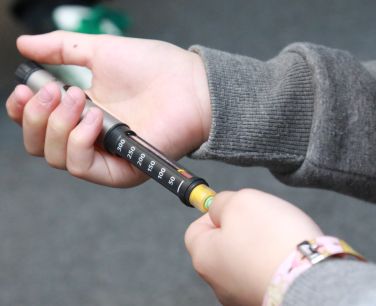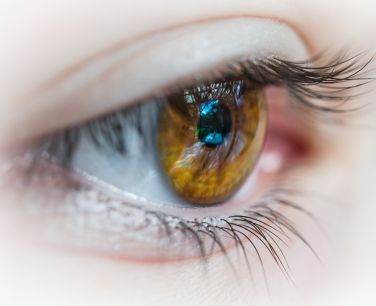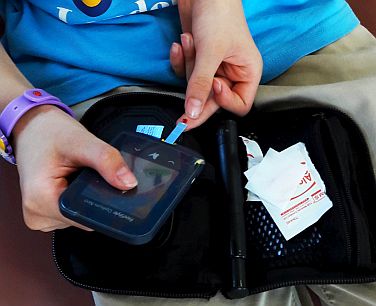Diabetes is a serious chronic condition where your blood sugar levels, also called blood glucose, are too high. Blood glucose is your main source of energy and comes from the food you eat.

Insulin is a hormone made by the pancreas, which helps glucose from food get into your cells to be used for energy. In a healthy body, the pancreas maintains the balance between food intake and insulin production. Beta cells are responsible for producing the hormone, insulin.
When a person eats, the pancreas releases the exact amount of insulin needed to turn the glucose into energy. When your body doesn’t make enough—or any—insulin, or doesn’t use insulin well, then the glucose stays in your blood and doesn’t reach your cells. Therefore causing high blood glucose levels.
Having too much glucose in your blood, over time, can cause diabetes related health complications like nerve damage and heart disease. Although diabetes has no cure, you can take steps to manage your diabetes and stay healthy.
What are the different types of diabetes?
The most common types of diabetes are Type 1, Type 2, and Gestational diabetes.
Type 1
Type 1 diabetes is an autoimmune condition whereby the body produces no insulin. The immune system attacks the body, so the beta cells in the pancreas are destroyed. Therefore it is unable to make insulin, causing a severe lack of insulin. No one knows for certain why this happens, but the trigger is likely caused by a viral or other infection. It can happen to anyone and is not caused by anything someone did or didn’t do, or their lifestyle choices.
Type 2
Type 2 diabetes develops when the body either does not make enough insulin to meet the body’s needs, or the insulin produced does not function properly. This is known as “insulin resistance”. The amount of insulin produced by the pancreas is insufficient to respond to the glucose in blood and over time can’t make enough to keep the blood glucose at normal levels. As a result, blood glucose level rises. Type 2 is often linked to lifestyle choices, being inactive or having a family history of Type 2.
The following risk factors increase the chances of developing Type 2 diabetes:
- Increase in age
- Obesity
- Physical inactivity
Gestational
Gestational diabetes is high blood glucose that develops during pregnancy and usually disappears after giving birth. Like other types of diabetes, gestational diabetes occurs if your body cannot produce enough insulin to meet the extra needs in pregnancy.
Having gestational diabetes can cause problems for expectant mothers and their baby during and after birth. But expectant women can help control it by eating healthy foods, exercising and, if necessary, taking medication. Controlling blood glucose can prevent a difficult birth and keep mother and baby healthy.
Diabetes misconceptions
Eating too much sugar causes diabetes – That is not true, however, it may cause obesity, which can increase the risks of developing the disease, especially Type 2 diabetes.
Stress causes diabetes – The cause of diabetes is unknown, however stress could be a potential trigger of turning the body against itself (as in Type 1 diabetes). It may worsen the symptoms for people who already have diabetes.
Diabetes is contagious – Someone with diabetes can’t pass it on to another person.









